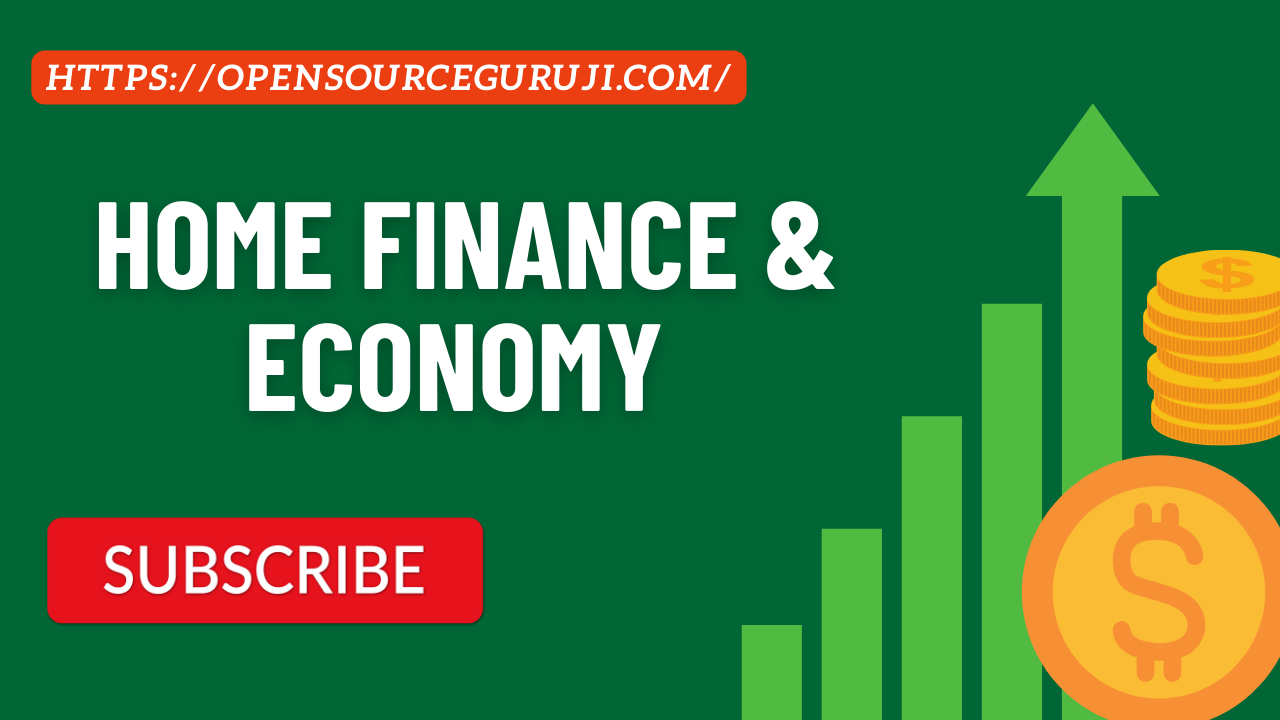
Home Finance & Economy.
Title: Home Finance and Its Effect on the Economy
Introduction: Home financing has a significant impact on both personal financial well-being and the economy. It comprises the numerous financial tools and techniques used in the purchase, ownership, and investment of residential properties. Home finance dynamics are inextricably tied to economic considerations, which influence consumer spending, investment patterns, property markets, and general economic stability.
Importance of Home Finance:
For both individuals and families, owning a home is frequently seen as the cornerstone of financial stability and wealth growth. Mortgages and other forms of finance enable people to purchase homes that are valuable assets in addition to being places of residence. Being a homeowner promotes stability, security, and pride in one’s home, all of which improve society as a whole.
1. Wealth Accumulation:
A major share of household wealth is comprised of real estate, particularly residential properties. As mortgage debt is paid off and property prices rise over time, home ownership enables people to accumulate equity. This accumulated money can be used to launch new firms, finance retirement, fund education, and so on, all of which promote prosperity and economic growth.
2. Economic Stimulus:
The housing sector has a profound impact on the economy, influencing employment, consumer spending, and investment. Home ownership stimulates economic activity through demand for housing-related goods and services, such as construction, renovation, furniture, and appliances. Moreover, rising home values often lead to increased consumer confidence and spending, fueling economic expansion.
3. Financial Intermediation:
By bringing borrowers and lenders together, home financing makes it easier to allocate money effectively. Through a variety of mortgage packages, banks, credit unions, and mortgage lenders offer finance to those looking to buy homes. By increasing the liquidity of the housing market, this intermediation process makes home ownership more accessible to a wider range of people and encourages economic mobility.
Challenges and Considerations:
Although house finance has many advantages, there are drawbacks as well, which may affect people’s lives as well as the overall state of the economy.
Affordability: The expense of housing is still a major worry, especially in areas where income levels are low compared to housing costs. Growing housing costs, stagnating incomes, and a shortage of available housing all contribute to affordability issues, making home ownership more and more unattainable for a large number of people and widening the wealth gap.
Mortgage Market Dynamics: The accessibility and affordability of mortgage finance can be impacted by changes in lending requirements, interest rates, and credit availability. Economic variables that affect home affordability and market activity include unemployment, inflation, and central banks’ monetary policy decisions. These variables can also have an impact on mortgage rates and borrowing costs.
Financial Stability Risks: As the global financial crisis of 2008 showed, excessive leverage and speculation in the property market can be dangerous for one’s financial stability. The housing bubble and subsequent market crisis were caused by rapidly growing home values, careless lending practices, and the secularization of mortgage debt. This highlights the connection between home financing and overall economic stability.
Policy Implications: In order to encourage sustainable home ownership and reduce systemic risks related to home financing, effective policy measures are necessary.
1. Initiatives for Affordable Housing:
Governments can enact laws to boost the number of available homes, encourage the construction of affordable homes, and aid low- and moderate-income people. Subsidies, tax breaks, and zoning changes are a few examples of affordable housing programmes that seek to increase housing affordability and lessen differences in home ownership rates.
2. Prudent Oversight and Regulation:
Regulators are essential to maintaining the stability and soundness of the mortgage industry. To reduce systemic risks and shield customers from predatory lending practices, prudent regulation and supervision of financial institutions, mortgage lending practices, and securitization activities are crucial.
3. Financial Education and Counseling:
Giving people home ownership counseling and financial literacy training can enable them to make financially responsible decisions for their homes. The prevention of foreclosure and the promotion of long-term home ownership can be achieved through educational programmes that support prudent borrowing, budgeting, and mortgage management.
In summary, home finance is a complex field that affects housing markets, individual financial health, and the whole economy. Home finance is a key factor in generating economic growth and prosperity since it makes home ownership easier, stimulates economic activity, and shapes wealth accumulation. But legislators, financial institutions, and other stakeholders in the housing ecosystem must work together to address issues of affordability, maintain financial stability, and advance equitable access to home ownership.